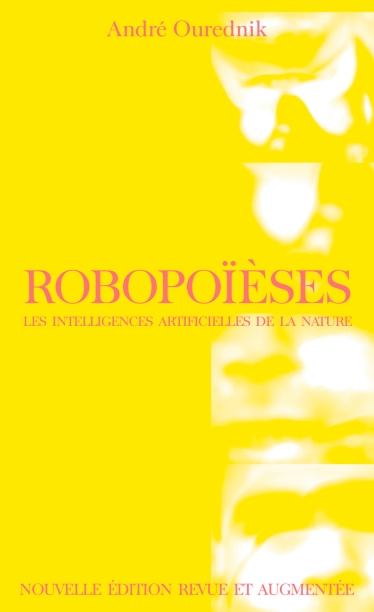Robopoiesis : the Artificial Intelligences of Nature (2nd revised and augmented edition)

|
André Ourednik, 2024, Robopoiesis : the Artificial Intelligences of Nature (2nd revised and augmented edition), La Baconnière, Genève. Artificial intelligence, as we understand it today, feeds on the ideology of the self-made man, which the biggest investors in the field take as a model of intelligence. To escape this reduction, we need broader perspectives. This essay argues that AI preceeds the Silicon Valley by several millenia, as a collective effort to to create artificial systems that mediate our relationship to nature. From the law tablets of the city of Ur, to generative algorithms, this is the story of the growing autonomy of thinking devices. Will future AI help us in our relations with living beings and with our own subjectivity? Order onlineAt lalibrairie.com Independant libraries France By ISBN 978-2-88960-144-8 (search bookstores with Google) Listen to the sound performance "Roboraisons Robopoïèses"Critiques and comments“Ourednik relates "artificial intelligence" and nature, in a complex weave and a game revolving through historical time. A game that involves capture and imitation, but also limitations, and premises of destruction. Combining mathematics, natural sciences, philosophy, history and literature, Ourednik looks back at the invention of automata, mechanization and cybernetics. He also focuses on cities as artifices for thinking and experiencing space, and on formalization systems - from writing to neuromimetic networks and fractals. And in the process, he passes through the milestones of the history of thought and technology, as well as taking his own distinctive side roads. ... And he doesn't hesitate to dwell on very concrete aspects, such as a detail in the life of a researcher, which sheds new light on research and opens up other possible focal points, with a more embodied aspect of the intellect. ... A fascinating and brilliant essay, highly recommendable.” Alain Freudiger, Nature, intelligence et artifices, La Distinction, September 2021 “Navigating between human sciences and computer science, André Ourednik reminds us of the true essence of learning machines. His book "Robopoiesis" is ideal to curb the fantasies about the all-powerful A. I. ... A text that is argued, precise, but also judiciously critical on the development of artificial intelligence and their impact on the organization of our contemporary societies”. Fabrice Gottraux, L’intelligence artificielle ne nous veut aucun mal. L’humain, en revanche…, 24 Heures / Tribune de Genève, 12.6.2021 “Erudite and mischievous, historical and speculative, technical and poetic, this is undoubtedly one of the most stimulating books of the moment on the realities and fantasies of artificial intelligence...” Hugues, Charybde 27 : le Blog, 1.1.2021 “...this invigorating and accessible essay... ...develops the idea that mankind has already started a long time ago to externalize its thought processes. Aren't language and mathematics already totally artificial creations? By questioning our relationship with nature and artifice, he opens up some fascinating avenues of philosophical reflection, and goes through history in search of abacus, ancient mechanisms, automata and other independent systems capable of self-regulation, which have constituted so many steps towards artificial intelligence as it is understood today. It leads to contemporary issues of democratic control of algorithms and the presuppositions that form the worldview of machines. A fascinating book, which also exposes the stakes linked to the influence of large technological groups on society and why the absence of rules in the field of artificial intelligence is a danger that is still too little understood.” Stéphane Babey, Vigousse, 14.5.2021 “André Ourednik is not only one of the rare authors in French-speaking Switzerland to write highly documented dystopias, he is also a scientist capable of describing a fractal of plant evolution. In his latest essay, as an Aristotelian mixed with a digital engineer, he poetizes a process without end since the monstrous development of the human brain: artificial intelligence, i.e. capable of artifacts, of artistic combinations. A beautiful journey extended by an online sound creation.” CC, QWERTZ, #64, RTS-Culture, April 3rd 2021. “Between the poet and the machine, there is André Ourednik... the writer never stops rethinking the world in the light of the digital, of its omniscience which reconfigures our relationship to reality and memory... It is another history of artificial intelligence that he unfolds here, whose cradle would not be located in the valley of silicon but in the primitive times of the appearance of language. By considering AI in a more encompassing perspective, that of "thinking devices" that cannot be reduced to printed circuits, the author moves from ancient Mesopotamia to Conway's Game of Life, from the golden ratio to Vedic meganumbers, from magic formulas on turtle shells to artistic algorithms. Erudite, literary, philosophical, mathematical and computer marquetry, where the prospect of an autonomous AI creative enough to reconcile us with nature takes shape. Dense and stimulating.” Thierry Raboud, La Liberté, March 20th 2021. Citations and critiques sur Babelio.com |